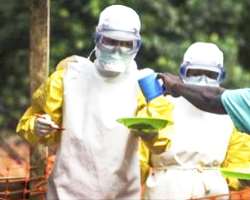Ebola Trial Drugs Raise Anxiety Crisis For Exponential Spread

Alarms at Ebola first diagnosis in USA raise more ethical questions about who gets experimental drugs and where to dispense limited supply in case anything goes wrong. There are histories of humans used as guinea pigs in the past. Best of intentions cannot erase retrospective mistakes. Dr. Frieden Director, Center for Disease Control assured everyone: if densely populated Lagos State can successfully employ Contact Tracing to fish out Ebola virus carriers, so can the United States without fear.
We have raised crisis of expectation against Ebola. Experimental drugs are not magic bullets to displace old fashion medical management that worked well in Nigeria. It's not politically correct to tell Africans that even if all the experimental drugs for the cure of Ebola are available right away, no country has been able to make drugs accessible, cheap and fast enough for all its sick population. We must learn from HIV drugs and how they gradually became available to many.
As much as Center for Disease Control and other regulatory agencies tried to dampen the high unsustainable expectation for magic bullets for fear that it may hamper necessary efforts needed on the ground to arrest the transmission of Ebola virus, affected countries want drugs. Anyone with a relative dying or sick with Ebola virus surely wants a cure by any means. Some traditional healers have taken advantages of their desperations in the towns and villages.
Prevention is better than cure is not a cliché here but the very basis in public health. It felt good to see the doctor in Liberia playing his unique role by giving an HIV drug called lamivudine to his patients and claimed very high survival rate. Even Z-Mapp is not expected in the market until 2015. The question, again becomes how many people in Liberia, Sierra Leone and Guinea can be cured if the exponential spread is not immediately arrested now? See Z-Mapp & Lamivudine
The exponential spread of Ebola virus must be kept in focus on how to arrest transmissions as it is getting too late. Nobody is advocating that hard and difficult work on drugs should stop but it must not overshadow contact tracing by environmental health investigation and immunization if available. Production of drugs is far more expensive than the cost of prevention.
There were lessons learned from Congo outbreak of Ebola in 1976. Yet we lack determination for sustained effort to build on the work of insightful precedents. Once a conscientious worker retired or out of reach, all the effort and dedication are wasted. New programs are started without completing the one they met. Indeed, inspection of the old project would show that it had been overrun by the bush and rodents in an abandoned area.
Nigeria and Ghana have helped with logistics and offered healthcare workers training to citizen of countries where Ebola is still endemic. The United Nation's decision to set up an Ebola Center in Accra could have been to reassure those sent there that they are not in an endemic area while making sure the center is close enough to countries affected. On the other hand, it has sparked fear in some because of the risk of introducing the virus into the country.
It is challenging enough for Doctors Without Borders and United States Army establishing and breaking ground for the 17 Health Centers. Logistic support in developing countries can be very challenging for those breaking the ground. They need all the support they can get and not suspicion of their mission in the face of Ebola virus.
There is early study from Gabon that certain amounts of antibodies were found among healthy folks and the elders that survived 1976 Congo outbreak. Most traditions only last for a period but we must change our attitude as diseases around us may mutate as flu virus. Any tradition that stands still will die with the changing times. We know the drugs that worked in one season for a flu virus might not be effective in the next season. The same is true for immunization.
There are modern ways to develop immunities to diseases. Africans must do more and cannot be expected to be saved from ourselves. In the face of Ebola virus we must break with certain traditions that claimed loyalty to the dead like washing faces or tasting the water used to wash anyone to swear or gain immunity against diseases. It does not matter if the dead body is that of your husband, relatives or children.
Local immunization by tradition has been practiced in Africa for ages. Some do it by slight cuts to the bodies and rubbing tiny bit of the infection in; with the hope that antibodies would develop to fight the real infection. Others drink or rub the body with these infections to get immunity just as they take a bit of snake venom to survive snake bites. These crude ways of immunization is dangerous and can easily kill and spread diseases.
African politicians and elites have either stolen money meant for public health centers or spent it on themselves for treatments that only affect a few in expensive hospitals overseas. It is not difficult to compare the amount spent on one person with the care 100 health centers provide at home to arrest and prevent the outbreak of Ebola and parallel diseases. They carry beggar mentality to foreign countries asking for drugs being developed by private companies.
The vigilant efforts deployed at airports in Ebola endemic areas, must be extended to the whole countries. The fact is, these days, even humanitarians and countries with the best of intentions want your boots on the ground. We have known about Ebola since the seventies and politicians kept spending our limited healthcare money on the least amount of people instead of most dollars on most number of people. By now infectious diseases such as Ebola should have been our medical specialty. Heaven helps those who help themselves.
